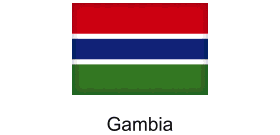African Travel Revolution: Gambia and South Africa Seal Historic Visa-Free Accord

The Gambia and South Africa are advancing towards a Mutual Visa Exemption Agreement, a pivotal move designed to significantly enhance trade, tourism, and cultural exchanges between the two nations. This critical development emerged from high-level discussions between The Gambia's Foreign Minister, Hon. Sering Modou Njie, and his South African counterpart, Hon. Ronald Lamola. The meeting, which took place on the sidelines of TICAD 9 in Tokyo, saw both ministers hail the enduring bonds of solidarity rooted in shared values of African unity, mutual respect, and cooperation, expressing a collective vision for an expanded partnership across various sectors.
The proposed visa exemption agreement stands as a top priority for both governments, reflecting a strong commitment to fostering greater people-to-people and business connectivity. Once finalized, this agreement will not only simplify travel between The Gambia and South Africa but also serve as a powerful catalyst for increased bilateral trade, investment, and more vibrant cultural and tourism interactions. This initiative is set to unlock significant opportunities for stakeholders within the travel industry across sub-Saharan Africa, including airlines, tour operators, and hospitality providers, by eliminating a major barrier for potential visitors. Local experts anticipate this policy shift could encourage the establishment of new airline routes, stimulate joint marketing efforts, and inspire innovative multi-country travel packages that showcase the unique heritage and attractions of both nations.
Beyond tourism, the easing of entry requirements is poised to streamline business travel, facilitate investment missions, and cultivate cross-border partnerships. Entrepreneurs and exporters will experience greater efficiency in navigating both markets, while investors will gain easier access to the economies of The Gambia and South Africa. This enhanced exchange of goods, services, and expertise is expected to drive the development of new supply chains and foster value-added services across diverse industries, from agriculture and manufacturing to technology and the creative arts.
In addition to facilitating mobility, the ministers also agreed to strengthen diplomatic ties through expanded cooperation in capacity building and diplomatic training. This institutional collaboration, aimed at sharing expertise, best practices, and training opportunities, is deemed vital for developing resilient diplomatic institutions capable of effectively addressing both regional and global challenges. This focus on skills development and knowledge transfer will empower the next generation of diplomats and public servants, positioning both countries as key players in African diplomacy and regional integration efforts.
The move by The Gambia and South Africa is seen as a compelling example of the evolving landscape of regional mobility within Africa. As an increasing number of African nations embrace open skies and simplified entry protocols, this agreement could inspire similar arrangements, thereby accelerating progress toward the African Union’s ambitious goal of greater continental unity and economic integration. The discussions concluded with a firm joint pledge to expedite cooperation in these priority areas, ensuring the relationship between The Gambia and South Africa continues to deepen and diversify. The upcoming stages will involve the finalization of the legal and operational frameworks for the visa exemption, alongside the rollout of joint initiatives in training and capacity building, with all eyes on the tangible benefits these measures will bring to travelers, businesses, and communities. For Africa’s travel sector, this partnership stands as a powerful example of how visionary policy can unlock new horizons—making the continent more accessible, prosperous, and interconnected than ever before.
You may also like...
Chaos at West Ham: Soucek's Horrific Challenge Seals Thrashing by Tottenham

Tottenham secured a commanding 3-0 victory over West Ham, a match largely defined by Tomas Soucek's red card for a reckl...
Woltemade's Stunner: Record Signing Nets Dream Debut Winner for Newcastle

Newcastle United secured their first Premier League victory of the season thanks to a debut goal from new signing Nick W...
Nicole Kidman Confirms 'Practical Magic 2' Wraps: Fans Rejoice for Magical Sequel Update!

"Practical Magic 2" has officially wrapped filming, as confirmed by star Nicole Kidman, with a release date set for Sept...
Oasis Reignites the Stage: Latin American Reunion Tour Kicks Off with a Roar!

Oasis reunited for their highly anticipated 'Oasis Live ’25' tour, kicking off its Latin American leg with a sold-out sh...
Foo Fighters Unleash New Era: Ilan Rubin Joins on Drums, New Music and Live Debut Announced!

The Foo Fighters are set to perform their first live show with new drummer Ilan Rubin in a surprise all-ages gig in San ...
Royal Quirks Exposed: King Charles' Peculiar Habits and Fashion Demands Revealed

Royal insider Paul Burrell sheds light on King Charles's rigid routines and peculiar habits, including his strict views ...
Pandora's Grandeur: Sigourney Weaver Unveils 'Avatar's' Unbelievable Ambition

Bryan Fuller's directorial debut, 'Dust Bunny,' premiered at TIFF 2025, offering a darkly whimsical fairy tale starring ...
Shoppers Raving Over M&S's £19 Autumn Trousers: The Ultimate 'Staple' for Comfort and Style

Marks & Spencer is capturing autumn shoppers' attention with two highly sought-after items: versatile wide-leg trousers ...
